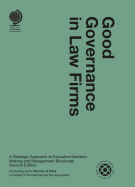
Since the first edition of Directors’ Liability and Indemnification was published, the world has been turned upside down by the global financial crisis. In your view, how has this affected the way that businesses are run?
It has had a profound effect on the way that financial institutions are run, both directly (through government intervention/ownership) and indirectly (through heightened regulation and litigation). It will be many years before this sector normalises. The main issue for other businesses has been the lack of available credit, so that even well-run businesses have felt the pinch or have had to rein in their plans. All businesses are now run more conservatively, as they try to avoid insolvency and gradually rebuild their balance sheets.
What is the main impact of the financial crisis on directors’ duties?
Directors’ duties themselves have not changed a lot, but the way they are applied to directors may be changing. Standards of conduct will be applied more rigorously to directors seen to be well paid in the current economic climate. For other directors, the fact that their companies are trading in very difficult conditions will be taken into account when assessing their liability for corporate failure. In the United Kingdom, the biggest source of claims is still insolvency; and had it not been for government intervention, some of the institutions that were not allowed to fail would undoubtedly be bringing claims against their former directors.
Are directors more vulnerable to being made personally liable in the face of tighter rules and regulations for corporate conduct?
The effects of increased regulation tend to be twofold: on the one hand, a short-term reduction in civil claims as corporate behaviour improves in response; but on the other, more investigations by regulators. Investigations may target individuals as well as companies, and fines levied against individuals are not indemnifiable by their companies. The costs of defending regulatory proceedings are very high indeed. Directors’ and officers’ (D&O) insurance is especially valuable in this latter context.
Is a claim culture putting off prospective directors?
We are definitely seeing increased concern on the part of prospective non-executive directors about exposure to liability.
The new edition has extended its range of coverage, adding further chapters in a number of key jurisdictions. Were you struck at all by the differences of any particular D&O issues discussed?
My main take-away from the work we did this time is that regulation and criminal liability are universal, and increasing everywhere. Civil liability is confined to a dozen or so developed countries and the other countries are still some way behind.
What general advice would you give to directors to ensure that their interests are well protected in the current economic climate?
There is no substitute for good, documented risk management. Beyond that, ensuring that board decisions are properly minuted and explained will reduce the scope for claims; and if necessary, a director should be prepared to resign if he or she is unhappy with the way the company is being run. In case things still go wrong (and sometimes this is unavoidable), directors should have indemnity agreements with their companies in place (to the extent permitted by law) and D&O insurance as a back-up.







